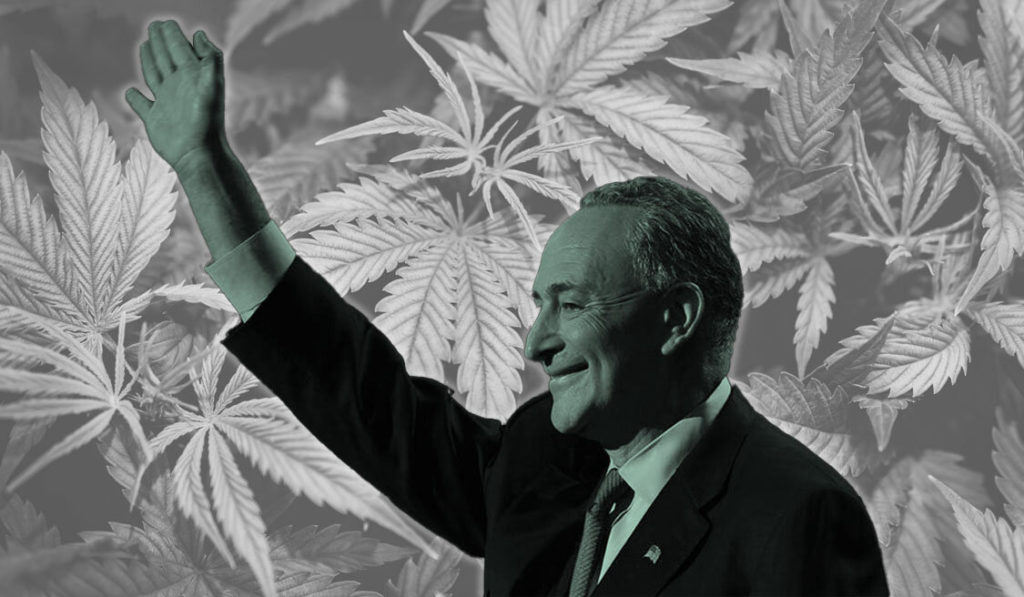Earlier this month, when Senate Majority Leader Chuck Schumer hinted that he would be introducing federal cannabis reform legislation, many expected it to be a federal decriminalization bill and most thought it would arrive on or around Apr. 20.
Instead, on Apr. 19, the House Of Representatives voted in favor of The Secure and Fair Enforcement Banking Act—or the SAFE Act—which finally allows banks and other financial institutions to work with cannabis companies (something that has not been allowed due to cannabis being a Schedule I substance and federally illegal).
And well, that’s all we have heard so far at least. NORML Political Director Justin Strekal praised the SAFE Banking Act vote but also made sure to pivot to the necessity of making cannabis no longer federally illegal.
“For the first time since Joe Biden assumed the presidency, a supermajority of the House has voted affirmatively to recognize that the legalization and regulation of marijuana is a superior public policy to prohibition and criminalization,” Strekal said. “However, the SAFE Banking Act is only a first step at making sure that these state-legal markets operate safely and efficiently. The sad reality is that those who own or patronize the unbanked businesses are themselves criminals in the eyes of the federal government, which can only be addressed by removing marijuana from the list of controlled substances.”
This follows a trend of cannabis reform cowardice by many Democrats. In the couple of months leading up to the election, Democrats announced they would delay a vote on The MORE Act which would have, among other things, made cannabis no longer federally illegal. Following the election, House Democrats voted to pass The MORE Act and soon after, Schumer said that he, along with Cory Booker and Ron Wyden would be releasing “a draft discussion bill outlining how best to legalize and regulate cannabis and cannabis commerce in a post-prohibition America.”
NORML’s Strekal noted that this draft discussion bill has not happened.
“Today’s vote is another important mile marker on the road to repealing federal prohibition, yet much more action must still be taken by lawmakers in both chambers,” Strekal said. “In the Senate, we are still waiting on a comprehensive proposal promised by Senate Majority Leader Schumer and Senators Cory Booker and Ron Wyden and in the House, we anticipate additional efforts to move forward and pass comprehensive reform legislation like The MORE Act — which was approved in the previous Congress — in order to ultimately comport federal law with the new political and cultural realities surrounding marijuana.”
Meanwhile, President Joe Biden has shown himself to be even less willing to embrace cannabis reform. Recently, White House Press Secretary Jen Psaki told reporters that Biden’s stance “has not changed” when it comes to legalization—and that came on the heels of Biden’s administration firing staffers for past cannabis use and Vice President Kamala Harris saying the administration is focused on other things and cannot get to cannabis. “Honestly, right now, we’ve been focused on getting people food, helping them stay in their apartments or in their homes, getting kids back to school, getting shots into arms,” Harris, who campaigned on decriminalization and record expungement, said. “That has been all-consuming.”
That was, as Marijuana Moment noted, “the first time either Harris or President Joe Biden has publicly talked about cannabis since the November election.
Politico also recently wrote that support for cannabis legalization among Democrats is not as strong as many think: “Senate Majority Leader Chuck Schumer’s biggest challenge to legalizing marijuana is his fellow Democrats,” Nicholas Wu and Natalie Fertig reported.
Democratic Senators Jeanne Shaheen of New Hampshire and Jon Tester of Montana told Politico they are opposed to legalization.
On Apr. 20, the day after the House passed the SAFE Banking Act, White House Press Secretary Psaki provided a disheartening—and confusing—response to a question about whether or not Biden would support federal legalization of cannabis.
“The president supports leaving decisions regarding legalization for recreational use up to the states, rescheduling cannabis as a Schedule 2 drug so researchers can study its positive and negative impacts, and at the federal level he supports decriminalizing marijuana use and automatically expunging any prior criminal records. He also supports legalizing medicinal marijuana,” Psaki said.
Decriminalization of cannabis however, means removing it from the Controlled Substances Act entirely not moving it to Schedule 2. Psaki was also asked if Biden would keep his campaign promise to release people locked-up for cannabis charges. Psaki’s answer was less than encouraging.
“I think when I’m talking about rescheduling cannabis as a Schedule 2 drug that is also going to have an impact on the criminal justice system as well,” Psaki said.
In other words, “no.”

